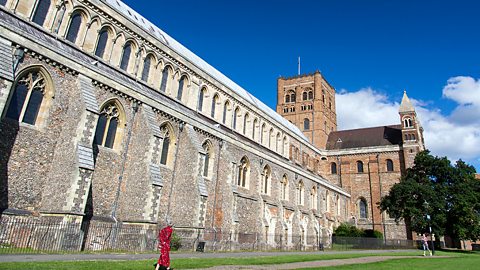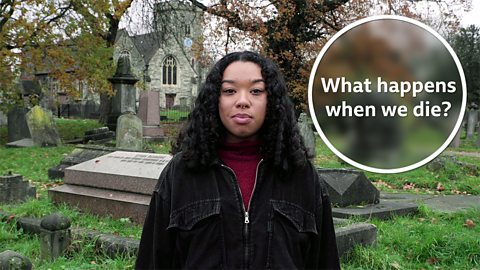Some people, whether they are religious or not, believe that grand religious buildings should be sold, and the money used to help the poor. They may feel that there is no need for believers to gather in such buildings and that alternatives should be found; perhaps simple, inexpensive meeting places, community halls or even each other’s houses. Others feel that such buildings are necessary to reflect their beliefs or the greatness of God, and to give thanks and praise.
Explore the issues
Watch Jamarl as he examines religious and non-religious teachings about buildings and charity.
Should religious buildings be sold to help the poor and feed the starving?
In Christianity, a church is a group of people meeting together to worship God, and that can happen in any building. So why not rent a space like many churches do in a hall, cinema, or theatre. In Islam, a mosque is a place of prostration. So in other words, a mosque is any clean space for a Muslim to bow down in prayer. And that can just be on a mat.It doesn't need to be in a special building.
And all religions teach that we should give to charity. So if everyone thinks it's a good idea, why not sell the buildings and do more of it? But the buildings themselves can be amazing works of art.
This mandir was created by people who thought of it as a huge act of worship to God. And a beautiful building can create the right atmosphere for prayer and worship.
But people don't come here to worship a building. They come to worship God. And so many churches are no frills and practical.
Holy buildings are used by the community for all kinds of activities: youth clubs, music groups, food banks, charity work, which helps everyone in the area, not just the people who come here to pray.
In Sikhism, people go to the gurdwara to hear the words of the Guru Granth Sahib read aloud, but they can also get a free meal.Anyone can.
So think about all the money this building will raise if sold, verses all the good it will do for the local community over its lifetime, which is better value? Perhaps there are other very expensive buildings that could be sold off instead.
Maybe religion should be putting people first in the short term, using their money to solve a few problems more quickly. But wouldn't selling these beautiful buildings be a shame? And what about the good work that goes on in them year after year? What do you think?
The cost of religious buildings
Most religions encourage their followers to help the poor and warn people that worldly possessions (like money, jewellery, designer clothing and cars for instance) are not important. Sometimes though, it seems that these teachings are forgotten about when it comes to places of worship. Many religious buildings are decorated with expensive materials and artworks, whilst some are very old and cost a lot of money to keep in a good state of repair.
Many people, whether they are religious or not, are critical of the way that wealth is used by some major religions. For example the Vatican (the headquarters of the Catholic Church) is home to many priceless works of art. Hindu temples are usually made of valuable materials like marble and covered in expensive carvings, but are often located in the poorest parts of India. Even some faithful followers of these religions, as well people outside these communities, feel strongly that these buildings, or at the very least some of their decorations, should be sold to help the poor.
Words of wisdom
What do religions teach about helping the poor and starving? Click the image below to find out.

Historical buildings
The Church of England owns land worth around £2 billion. Many of its churches are built on some of the most expensive land in England. Selling this land and the churches on it would certainly raise a huge amount of money that could be used to reduce the suffering of many people. However, some may argue that these buildings are part of the country's history, and once sold they may be altered, or even destroyed meaning they would be lost for future generations to see and enjoy. Churches also have an important role in many communities across the UK; they bring people together, not only to worship, but also to feed the needy with food banks, and as centres for education and all sorts of charity work.
On the other hand, lots of people argue that a beautifully decorated building, with no expense spared, honours God. Such people may also say that if everyone lived by the teachings of their religion regarding kindness and generosity to the poor, then many people could be helped out of poverty, without the need to sell places of worship.


Religious buildings and the community
With declining numbers of people attending places of worship, is it time to start thinking about alternatives? Perhaps religious groups could hire spaces or even share a building with other religious communities as many already do. Some religious communities are already finding different ways to gather, without the need for a special building to worship. For example, the ‘house church’ movement of Christians meet in each other’s houses just like the very first Christians did. We live in a digital age, so could religious communities move online and make forms of worship available on the internet?
Many religious buildings were built by and for the poor. They are places where members of faith communities can come together to celebrate life’s big events, such as births, weddings and funerals. They are also places where many of the poorest in society can turn at times of their greatest need. Without them, some would argue, helping the poor would be even more of a challenge. Many religious buildings do not just help believers in their relationship with God but also in their relationships with the needy.

Religious buildings in pictures

Image caption, Buddhism – The Marble Temple in Bangkok, Thailand
Locally known as Wat Benchamabophit, the Marble Temple is a famous Buddhist place of worship. It was built in 1899 for the King of Thailand, near his palace. It is constructed from expensive marble and is richly decorated inside and out. Why might some people say it is right for Buddhist temples to be constructed with fine and very expensive materials and designs, but others claim it is wrong?
1 of 7
Quiz
GCSE exam dates 2025
Find out everything you need to know about the 2025 GCSE exams including dates, timetables and changes to exams to get your revision in shape.

More on Morals, ethics and philosophy
Find out more by working through a topic
- count7 of 8

- count8 of 8

- count1 of 8






